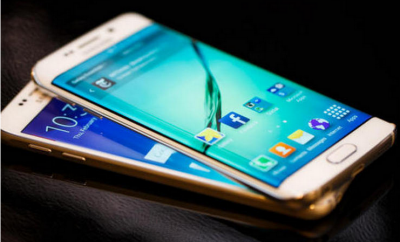
If you're hemming and hawing over which of Samsung's new Galaxy S6 superphones to order, let me help break down the major differences so you can decide which one (if any) is right for your pocket.
First things first. I reviewed both the Galaxy S6 and S6 Edge, and they're both terrific. They're also almost identical in looks and performance, so you shouldn't sweat the decision either way.
What's the same
Let's make it easy. Everything the Galaxy S6 has, the Galaxy S6 Edge has, too. OK, so there are a few really minor hardware differences, like the G6 Edge's battery that's a skosh larger than the S6's -- 2,600mAh versus 2,550mAh.
More importantly, though, they share these headliner specs:
Glass and metal build
5.1-inch ultra-high definition screen (2,560x1,440-pixel resolution)
16-megapixel camera
Octa-core processor
Available in 32GB, 64GB and 128GB capacities
Fingerprint reader
Quick charging
Wireless charging (compatible with Qi-standard chargers)
What's different
There are two central physical differences between the phones: the shape and the S6 Edge's "Edge screen."
You can read about what it's like to hold both phones in my full reviews, but I will say here that the Edge's two curving-down sides makes the S6 feel every bit like the elite model.
The design comes across as both sharper and more petite, with an air of fragility that will likely make most S6 Edge owners dash to buy a case. (In all reality, everyone should buy a case and glass screen protector if they want to safeguard their investments.)
Then there's the Edge software, which includes ways to quickly reach and respond to the five most important people in your life, among other tidbits, like a night mode that dimly displays the date and time after lights-out. These are nice extras, but hardly catapult you to the next level of smartphone existence.
So, yeah. that fancy double tapered screen doesn't do all that much. But in a world where all smartphones are flat slabs of glass, this is one of the first ones in years that really sets itself apart from a design perspective. It's a looker.
How much more the S6 Edge will cost you
That leads us to the other big difference between the phones: price.
Carriers and retailers will set their own prices in your country and currency. For the sake of comparison, though, the 32GB S6 Edge costs between 14 percent and 19 percent more than the 32GB S6. In dollars, that's between $100 and $130 more for the same capacity.
If I were you…
On an absolute basis, I'd buy the Edge, for all the design reasons above, and even a bit for some of the Edge software too. (In truth, I could take or leave the Edge screen features, but I'd be miffed if Samsung hadn't done anything with that space.)
Too bad I'm not an absolutist. While Tech-loving Me would snap up the Edge in an instant, Financially-aware Me has to think twice about getting the Edge versus spending the extra money on more S6 storage, or something else entirely.
Over time, buying the Edge means you're paying that 14 percent to 19 percent more per month, but when you break it down, the few dollars difference (say $5 more per month according to one plan), amounts to only a little more than a latte. (Of course, those lattes add up over time.)
That's why the standard S6 is our CNET Editors' Choice -- it's the more prudent buy, and the overall better value.
All of which brings us full circle. S6 or S6 Edge, I truly believe they're equally smart purchases. If you're into design aesthetics, choose the Edge. If you're not, stick with the S6.
And if you're still unsure, get yourself into your nearest retailer for a little hands-on time of your own. Bar none, it's the best way to determine which of these two is for you.
Recommended: Come here to get more information of Samsung Galaxy S6 and S6 Edge.
Article Resourse: http://www.cnet.com/


